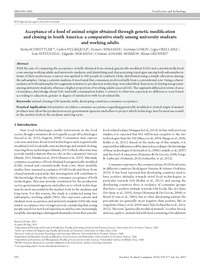Acceptance of a food of animal origin obtained through genetic modification and cloning in South America: A comparative study among university students and working adults
Autor
Adasme-Berríos, Cristian
Schnettler, Berta
Velásquez, Carlos
Miranda, Horacio
Lobos, Germán
Orellana, Ligia
Sepúlveda, José
Miranda, Edgardo
Grunert, Klaus G.
Fecha
2015Resumen
With the aim of comparing the acceptance of milk obtained from cloned, genetically modified (GM) and conventionally bred
cows among working adults and university students, and identifying and characterizing typologies among both subsamples in
terms of their preferences, a survey was applied to 400 people in southern Chile, distributed using a simple allocation among
the subsamples. Using a conjoint analysis, it was found that consumers preferred milk from a conventional cow. Using a cluster analysis, in both subsamples two segments sensitive to production technology were identified. Rejection of cloning was greatest among university students, whereas a higher proportion of working adults rejected GM. The segments differed in terms of area of residence, knowledge about GM, and milk consumption habits. Contrary to what was expected, no differences were found according to education, gender or degree of satisfaction with food-related life.
Fuente
Food Science and Technology, 35(3), 570-577Identificador DOI
dx.doi.org/10.1590/1678-457X.6699Colecciones
La publicación tiene asociados los siguientes ficheros de licencia:


